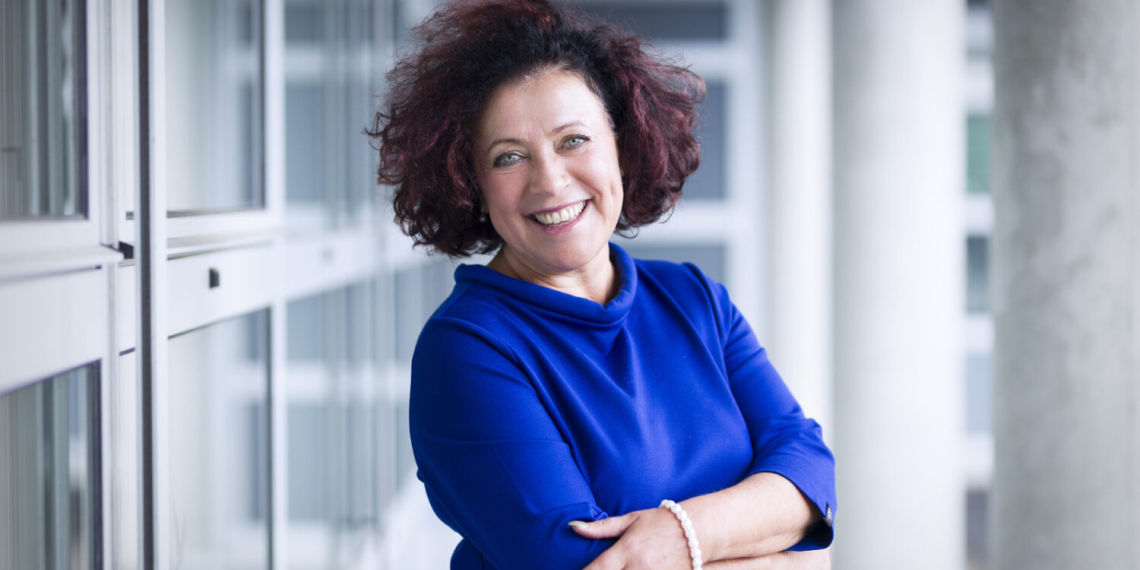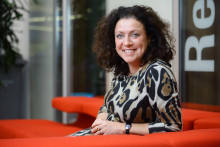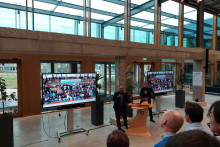Last year, there was a lot of discussion in The Hague about internationalisation and language policy in higher education. How is the BMS faculty experiencing that discussion?
Bondarouk: 'Sometimes very emotional. When I heard noises about returning to Dutch completely, or statements disputing the contribution of internationals, I thought: this can't be true. Our soft power, values and principles and the passing on of knowledge to other countries are suddenly under pressure, while the Netherlands has always been at the forefront of this with its international view. In the faculty, we had several conversations about this. Open conversations, in which there was room for all opinions, but I noticed astonishment from everyone.'
Aydin: 'The minister's letter was initially very generic. Something is coming, but what? The grounds for exceptions were and are also unclear. It is good that we, as a university, stand together in this discussion, and that our values and inclusiveness are and remain guiding. It is important to maintain two lines and link them together. On the one hand, you have to take into account political and social developments. As a university, we are not in a vacuum. After all, we want to be strongly connected to society. At the same time, you want to stick to your values. You don't want to let go of those, but rather strengthen them. You want to prevent your long-term values from being damaged by short-term interventions.'
HOW INTERNATIONAL IS THE BMS FACULTY?
About 3700 students study in BMS programmes, of which more than 40 percent are internationals. About 1900 students follow a bachelor's programme, more than half of them with an international background. BMS has some two hundred incoming exchange students, compared to 380 outgoing ones.
As for academic staff, about 30 percent are non-Dutch. Among support staff, the percentage is slightly lower at 20 percent. Among BMS PhD candidates, some fourty percent are international.
What is your main concern in the debate on internationalisation and the language of instruction?
Bondarouk: 'Academic freedom is under pressure. As a university, you want to be able to research and educate independently of political developments. You have to be able to set your own agenda, but tunnel vision in the discussion is putting us in a tight spot. We see international colleagues learning the language here, participating in society and wanting to understand the front pages of newspapers, but accessibility is suddenly under pressure.'
'Language is a relevant component, but the discussion needs to be broader' - Ciano Aydin
Aydin: 'Being inclusive means having access to good education for both Dutch and international students, without unnecessary barriers. Language is a relevant component in this, but the discussion should be broader. If language is a stumbling block, then you should help someone in that, but there are also other issues that can be a stumbling block for students and should be addressed.
Yet most of the House of Representatives - from left to right - think it would be better to offer bachelors in Dutch again. How does that square with your criticism?
Aydin: 'The question should be: what are we trying to solve with the language issue? The goal you want to achieve should be central. Politics has pulled the two apart and the goal has become invisible. We want nuance back in the discussion. If the problem is that students, especially in the first year, are struggling to catch on because of language, then that is relevant. Then we need to do something about it. And by the way, we do. Many students want to pursue a master's after a bachelor's, or a PhD, or work in an international setting. If you offer the bachelor's in Dutch, problems may arise later. Conducting research is by definition something international.'
Bondarouk: 'Moreover, it is a misconception that within BMS we only offer classical social sciences. We work interdisciplinary and the technical aspect is woven through the faculty. The same applies to collaboration with other faculties.'
Politicians, as well as NWO president Marcel Levi, cite psychology as an example of a course where they believe things are going wrong. Why is that so?
Aydin: 'It is a large study programme, with a large international population, which makes it stand out. Being open to criticism from politics and society is not wrong, but actually good. But the question has to be what you want to achieve. If politicians point out to us that the balance in education has grown lopsided, preventing us from achieving our goals, we are the first to say: let's look at a solution. But then you need trust from politics. Politics as an ally instead of an opponent. We don't feel that trust enough now, because the discussion has narrowed down to just a language issue.'
'Feeling welcome is the basis of everything, breaking that down has huge consequences' - Tanya Bondarouk
Bondarouk: 'There is so much nuance missing. In our bachelor's in psychology, the power of combining technology and psychology is key. Then I hear politicians shouting that we have to offer psychology in Dutch, because therapy has to be given in Dutch. Students are thoroughly prepared for this in their internships. We offer pathways to prepare international students to work in the Netherlands. We have plenty of examples of alumni who went on to work in the Dutch mental health sector after the programme.'
Are there any arguments mentioned in the House of Representatives that you do support?
Aydin: 'Absolutely. In the west, there is housing shortage and space scarcity. That is a problem and you have to solve it in a targeted way. But that is different from pointing to language or internationals as a problem. In fact, I see international students as a solution to current and future challenges and they enrich and strengthen our labour market and culture. Many Dutch students do the same abroad, but you understandably don't hear anyone complaining about that.'
(Text continues after the picture.)

Ciano Aydin.
Bondarouk: 'Above all, I hope that solutions will be looked at in a nuanced and specific way. The dangerous thing about this discussion is that breaking something is very easy. Rebuilding something takes so much time and energy. The impact is already huge. Non-Dutch people are getting an unwelcome or second-class feeling. While feeling welcome is the basis of everything. Breaking that down has huge consequences.'
'Let politicians come here on campus' - Tanya Bondarouk
How do you hope this chapter develops in 2024?
Bondarouk: 'I hope policymakers start speaking with teachers and students, rather than about them. Let politicians come here on campus. Talk to international students and lecturers about what they do, and what they contribute. I'm sure that will make a difference.'
Aydin: 'I hope for more balance by showing the other side of the coin in particular. By showing how great it is that we have international students and staff. How important their contribution is to Dutch knowledge development. It should be more than 'it's not bad that they are here'. Let's express how happy we are to have international people around us, instead of seeing them as a problem.'






